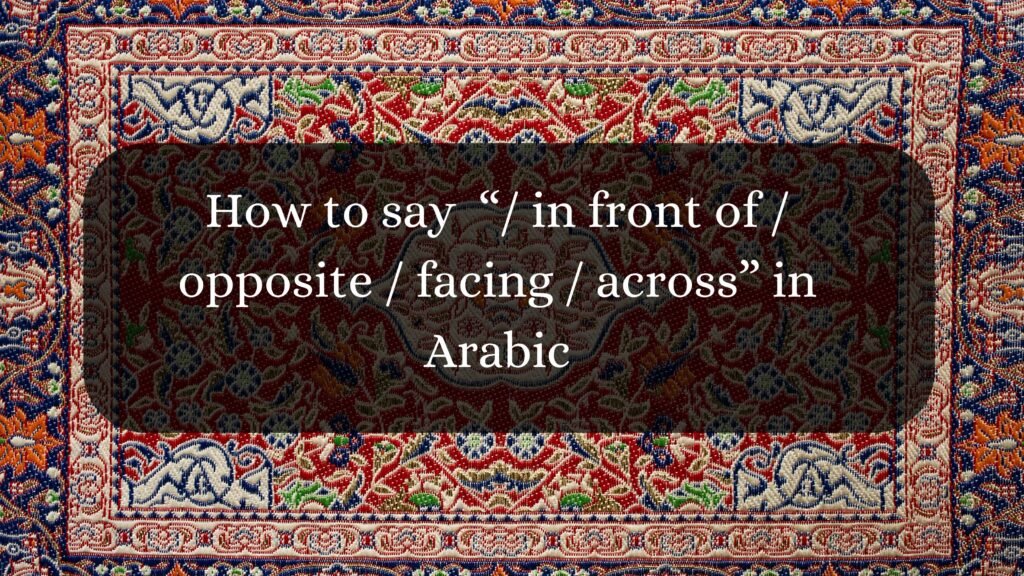
Before / in front of / opposite / facing / across
Before is usually used to indicate earlier than, already; in front of can only be used when talking about a place. Before (and not in front of) is used for lists, to mean in the presence of, and in a number of expressions (e.g. “before my eyes”). In Arabic, before is generally rendered as قَبْلَ, which can be used for both time and place, with أَمَامَ / أَمَامَهُ occurring with people only.
In front of is the opposite of behind, and like opposite and facing, means directly on the other side of (e.g., a road, river). When there is a sense of movement, only in front of is possible. Across also means on the other/opposite side of, but not necessarily directly opposite. In Arabic, in front of can be rendered by the following:
قُدَّامَ، قُبَالَةَ، أَمَامَ، تُجَاهَ، مُوَاجِهًا، قَابِلَ — all of which have invariable endings. e.g.
“The man ran towards (NOT facing/opposite!) the bus.”
رَكَضَ الرَّجُلُ نَحْوَ ٱلْأُوتُوبِيسِ
“The building across the street has been broken into twice this week.”
تَعَرَّضَ ٱلْمَبْنَى ٱلَّذِي يَقَعُ قُبَالَةَ ٱلشَّارِعِ للاِقْتِحَامِ مَرَّتَيْنِ هٰذَا ٱلْأُسْبُوعِ
“We came in before anyone else.”
جِئْنَا قَبْلَ أَيِّ شَخْصٍ آخَرَ
“The box in front of the cupboard needs to be repaired.”
إِنَّ ٱلصُّنْدُوقَ ٱلَّذِي أَمَامَ ٱلدُّولَابِ يَحْتَاجُ إِلَى تَصْلِيحٍ
“Faced with continuous attacks, an official source warned that the area would be turned into a living hell.”
حَذَّرَ مَصْدَرٌ مَسْؤُولٌ مِنْ أَنَّ ٱلْمِنْطَقَةَ سَتَتَحَوَّلُ إِلَى جَحِيمٍ حَيٍّ جَرَّاءَ ٱلِٱعْتِدَاءَاتِ ٱلْمُسْتَمِرَّةِ
NOTE: Across can also mean from one side to the other, which, depending on the context, is rendered in Arabic by:
نَحْوَ، فَوْقَ، عَلَى جَانِبٍ، نَحْوَ ٱلْجَانِبِ ٱلآخَرِ e.g.
“He ran across the street to see what was going on.”
رَكَضَ نَحْوَ ٱلْجَانِبِ ٱلْآخَرِ مِنَ ٱلشَّارِعِ لِيَرَى مَا يَجْرِي
“The trousers lay across the bed.”
إِنَّ ٱلسِّرْوَالَ مَوْضُوعٌ فَوْقَ ٱلسَّرِيرِ
“She is dragging along her stray buffalo across the iron track that cuts through the village.”
وَهِيَ تَجُرُّ جَامُوُسَهَا ٱلشَّارِدَةَ عَبْرَ ٱلْخَطِّ ٱلْحَدِيدِيِّ ٱلَّذِي يَخْتَرِقُ ٱلْقَرْيَةَ
